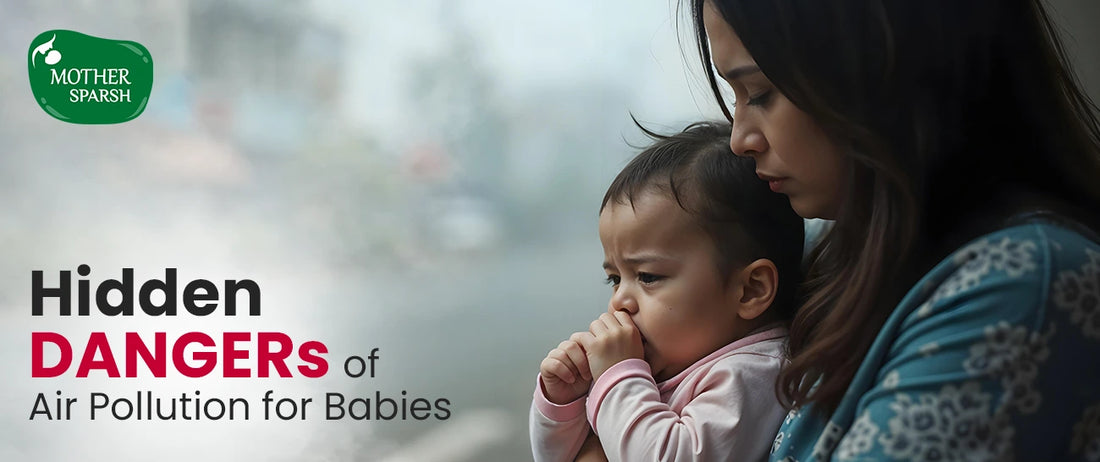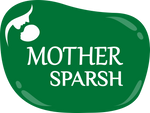
How Does Air Pollution Affect Your Baby's Health?
Table of Contents
- 1. How Air Pollution Triggers Congestion and Allergies in Babies
- - Pregnancy and Early Life Exposure
- - Traffic Pollution and Respiratory Health
- - Long-term Impact on Allergies
- 2. Solutions to Relieve Baby Congestion Caused by Air Pollution
- - Humidify the Air
- - Saline Drops for Natural Relief
- - Upright Position After Feeding
- - Instant Relief with Nasal Vapour Patches
- 3. Points to Remember
As you cradle your precious little one in your arms, it's natural to worry about the quality of the air they breathe. The invisible threat of air pollution poses a great risk to your baby's delicate lungs—a concern shared by many other parents. But, there is hope. While the idea of pollutants harming your baby's health is distressing, there are steps you can take to protect your little angel.
In this blog, we will explore how air pollution can lead to congestion in infants and, more importantly, offer practical solutions to help your baby breathe easier. Together, let's tackle this challenge and create a healthier environment for your child to thrive.

How Air Pollution Triggers Congestion and Allergies in Babies
Could the air they breathe be silently harming their health? The effects of air pollution on infants can be significant and long-lasting, especially when it comes to respiratory issues.
1. Pregnancy and Early Life Exposure
Your baby's journey begins long before birth. Shockingly, exposure to air pollution during pregnancy is associated with low birth weight and, in severe cases, stillbirth. This early exposure can lay the foundation for future health challenges, making it essential to monitor air quality even before your baby takes their first breath.
2. Traffic Pollution and Respiratory Health
Once your little one arrives, they begin interacting with the world around them. However, exposure to high levels of traffic and air pollution can increase the risk of asthma and other respiratory conditions. Imagining your child struggling to breathe is every parent's nightmare, which is why understanding air pollution's effects on babies is crucial to keeping them healthy.
3. Long-term Impact on Allergies
Your baby’s health journey extends far beyond infancy. Continuous exposure to air pollutants, both before and after birth, can increase the likelihood and severity of allergies and other immune-related issues. The air quality in and around your home has a significant impact on your baby's long-term well-being.
By recognizing the connection between allergies and air pollution in babies, you’re better equipped to create a healthier environment for your precious little one. Awareness and proactive steps can make a world of difference in their respiratory health.
Solutions to Relieve Baby Congestion Caused by Air Pollution

As a caring parent, you're naturally concerned about the air pollution effects on babies, especially when it comes to congestion. But don't worry – there are several simple and effective ways to provide baby congestion relief, helping your little pumpkin breathe easier and stay comfortable.
Humidify the Air
One of the simplest solutions is to use a cool-mist humidifier in your baby's room. The added moisture helps loosen mucus, making it easier for your little one to breathe. Place the humidifier near the crib, but out of reach, to create a soothing environment that promotes better sleep and easier breathing.
Saline Drops for Natural Relief
Gentle saline drops can work wonders for clearing your baby's stuffy nose. These drops help thin out the mucus, making it easier to remove. Tilt your baby's head slightly back and place a few drops in each nostril. This natural remedy is safe and can provide quick relief from congestion.
Upright Position After Feeding
Keeping your baby upright for about 30 minutes after feeding can also reduce congestion. This position helps prevent mucus from pooling in the back of the throat, making it easier for your baby to breathe comfortably.
Instant Relief with Nasal Vapour Patches
For quick and gentle relief, consider using nasal relief patches for babies like Mother Sparsh Nasal Vapour Patches. These patches release soothing vapours that help clear nasal passages, reducing congestion and providing much-needed comfort. Also, they are a gentle way to reduce air pollution symptoms in babies, ensuring your little one feels more at ease.
While these solutions offer relief, addressing the root cause is essential. Minimizing your baby’s exposure to air pollution and managing allergies and air pollution in babies are key steps to protect their delicate nose and lungs. With these simple methods, you can help your little one breathe more comfortably, even when air quality isn’t ideal.
Points to Remember
- Air pollution can harm your baby's lungs, making it essential to be aware of the air they breathe.
- Babies can be affected by air pollution even before birth, which can lead to low birth weight and other health issues.
- High levels of traffic pollution can increase the risk of asthma and breathing problems in children.
- Exposure to air pollutants can worsen allergies in babies, affecting their health as they grow.
- A mist humidifier in your baby's room can help loosen mucus and make breathing easier.
- Saline drops can clear a stuffy nose by thinning mucus, providing quick relief.
- Keeping your baby upright for 30 minutes after feeding helps prevent mucus buildup.
- Nasal relief patches can quickly soothe congestion by releasing calming vapours.
- Reducing exposure to air pollution is crucial for protecting your baby's health and helping them breathe easily.
FAQs
Que 1. Can air pollution cause congestion in babies?
Ans. Yes, air pollution can lead to congestion in babies. The harmful particles in polluted air can irritate their sensitive lungs, causing them to produce more mucus and making it hard for them to breathe comfortably.
Que 2. How can nasal relief patches help babies with congestion?
Ans. Nasal relief patches can be very helpful for babies with congestion. These patches release soothing vapours that clear nasal passages, making it easier for babies to breathe. They are gentle and safe for infants.
Que 3. Are nasal relief patches safe for newborns?
Ans. Yes, nasal relief patches are generally safe for newborns when used as directed. They are designed specifically for babies and provide a gentle way to relieve congestion. However, it's always best to check with a doctor before using any new product on your baby.
Que 4. What are the common symptoms of air pollution in babies?
Ans. Common symptoms of air pollution in babies include stuffy noses, trouble breathing, coughing, and increased irritability. If you notice these signs, it may be due to poor air quality.
Que 5. How can I reduce the impact of air pollution on my baby?
Ans. To reduce the impact of air pollution on your baby, you can:
- Use a humidifier to add moisture to the air and help with breathing.
- Apply saline drops to thin mucus and clear stuffy noses.
- Keep your baby upright for about 30 minutes after feeding to prevent mucus buildup.
- Use nasal relief patches for quick comfort.
- Monitor local air quality and limit outdoor activities on days with high pollution levels.
These steps can help create a healthier environment for your baby.





